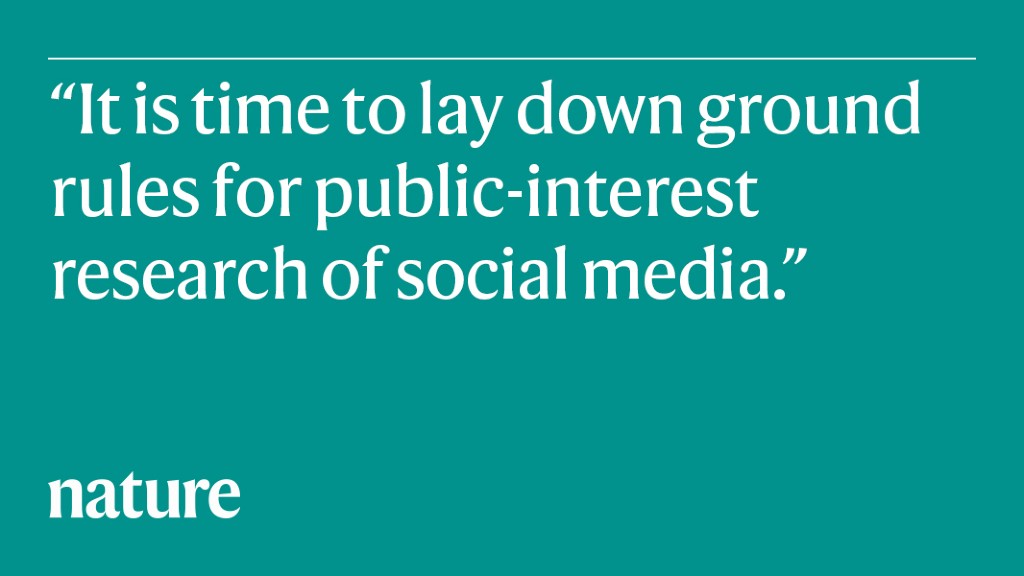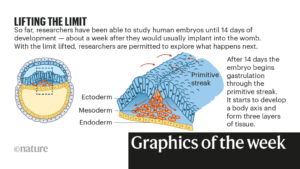Demand five precepts to aid social-media watchdogs
Early this August, Facebook shut down the private and organizational accounts of researchers related to New York University’s Ad Observatory, a undertaking during which knowledgeable volunteers enable research of promoting focused to their accounts. Facebook stated its transfer was vital to “protect people’s privacy” and to adjust to orders from the Federal Trade Commission. The FTC gave an unusually public response. It printed a press release saying that its restrictions don’t bar “good-faith research in the public interest”.

Early this August, Facebook shut down the private and organizational accounts of researchers related to New York University’s Ad Observatory, a undertaking during which knowledgeable volunteers enable research of promoting focused to their accounts. Facebook stated its transfer was vital to “protect people’s privacy” and to adjust to orders from the Federal Trade Commission. The FTC gave an unusually public response. It printed a press release saying that its restrictions don’t bar “good-faith research in the public interest”.
This marks a chance for anybody who thinks that social media’s results on democracy and society needs to be open to scrutiny. It is time to lay down floor guidelines to empower public-interest analysis on social media.
In a collaboration with Elizabeth Hansen Shapiro on the Tow Center for Digital Journalism in New York City, I and different colleagues interviewed dozens of researchers, journalists and activists who research how social-media platforms have an effect on democratic participation. Almost all named obstacles to knowledge entry as a significant impediment, even those that helped to design Social Science One, a extremely touted academia–business partnership to study the spread of misinformation.
Researchers have methods for coping with the lack of knowledge the platforms present, though many such methods are weak to authorized threats or restrictions. Ad Observatory asks for ‘data donation’ from a panel of net customers who set up a plug-in that permits researchers to research some elements of the online customers’ on-line exercise.
(adsbygoogle = window.adsbygoogle || []).push({});
Another method includes scraping — automated assortment of content material that seems to most people or logged-in social-media customers. This produces knowledge units similar to PushShift, essentially the most complete archive of content material obtainable on the Reddit on-line dialogue discussion board. Another is Media Cloud, a undertaking I keep with colleagues at a number of establishments to index thousands and thousands of stories tales a day and permit research of phrase frequencies over time. Its automated retrieval and data-storage options are technically similar to a search engine’s, and thus prohibited by the non-negotiable phrases of service required by most social-media platforms.
Until 2020, the United States’ troublingly obscure Computer Fraud and Abuse Act made researchers who violated a web site’s phrases of service weak to felony expenses. That 12 months, educational researchers argued efficiently that utilizing a number of social-media accounts to audit for discrimination shouldn’t be thought-about a legal exercise. A federal courtroom agreed that “mere terms-of-service violations” don’t advantage legal expenses.
Although the ruling is welcome, uncertainty for researchers stays, and social-media firms actively hinder their work. The FTC’s endorsement of ‘good-faith research’ needs to be codified into ideas guaranteeing researchers entry to knowledge underneath sure circumstances.
I suggest the next. First, give researchers entry to the identical concentrating on instruments that platforms provide to advertisers and industrial companions. Second, for publicly viewable content material, enable researchers to mix and share knowledge units by supplying keys to software programming interfaces. Third, explicitly enable customers to donate knowledge about their on-line behaviour for analysis, and make code used for such research publicly reviewable for safety flaws. Fourth, create safe-haven protections that acknowledge the general public curiosity. Fifth, mandate common audits of algorithms that reasonable content material and serve adverts.
In the United States, the FTC may demand this entry on behalf of shoppers: it has broad powers to compel the discharge of knowledge. In Europe, making such calls for needs to be much more simple. The European Data Governance Act, proposed in November 2020, advances the idea of “data altruism” that permits customers to donate their knowledge, and the broader Digital Services Act features a potential framework to implement protections for analysis within the public curiosity.
Technology firms argue that they have to prohibit knowledge entry due to the potential for hurt, which additionally conveniently insulates them from criticism and scrutiny. They cite misuse of knowledge, similar to within the Cambridge Analytica scandal (which got here to gentle in 2018 and prompted the FTC orders), during which an instructional researcher took knowledge from tens of thousands and thousands of Facebook customers collected by on-line ‘personality tests’ and gave it to a UK political consultancy that labored on behalf of Donald Trump and the Brexit marketing campaign. Another instance of abuse of knowledge is the case of Clearview AI, which used scraping to produce an enormous photographic database to enable federal and state law-enforcement businesses to establish people.
These incidents have led tech firms to design programs to forestall misuse — however such programs additionally forestall analysis vital for oversight and scrutiny. To be certain that platforms act pretty and profit society, there should be methods to defend person knowledge and permit unbiased oversight.
Part of the answer is to create authorized programs, not simply technical ones, that distinguish between unhealthy intent and bonafide, public-spirited analysis that may assist to uncover social media’s results on economies and societies.
The affect of social-media firms is simple, and executives similar to Facebook co-founder Mark Zuckerberg sincerely imagine that their platforms make the world a greater place. But they’ve been unwilling to give researchers the information to exhibit whether or not that is so. It is time for society to demand entry to these knowledge.



